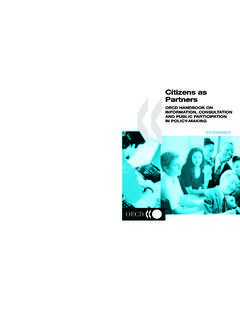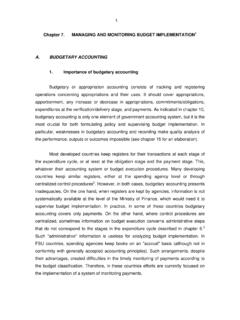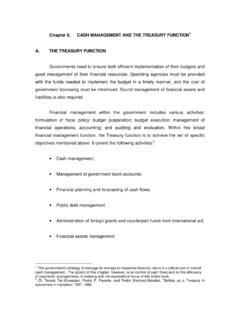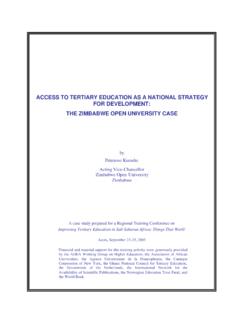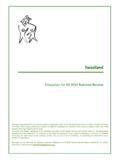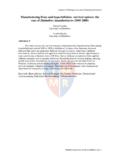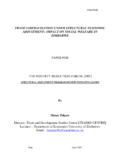Transcription of Open Budget Survey 2017 Partners - internationalbudget.org
1 AfghanistanIntegrity Watch AfghanistanAlbaniaAlbanian Socio-Economic Think-Tank ASETA lgeriaAssociation Nationale des Finances PubliquesAngolaAc o para o Desenvolvimento Rural e Ambiente (ADRA)ArgentinaAsociaci n Civil por la Igualdad y la Justicia (ACIJ)AustraliaTax and Transfer Policy Institute (TTPI), Crawford School of Public Policy, Australian National UniversityAzerbaijanEurasia Extractive Industries Knowledge HubBangladeshCentre on Budget and Policy, Department of Development Studies, University of DhakaBeninSocial Watch BeninBoliviaCentro de Estudios para el Desarrollo Laboral y Agrario (CEDLA)Bosnia and HerzegovinaFondacija Centar za zastupanje gra anskih interesa (Public Interest Advocacy Center)BotswanaBotswana Institute for Development Policy Analysis (BIDPA)BrazilInstituto de Estudos S cioecon micos (INESC)BulgariaIndustry Watch GroupBurkina FasoCentre pour la Gouvernance D mocratique (CGD)BurundiFor inquiries, please contact the International Budget PartnershipCambodiaThe NGO Forum on CambodiaCameroonBudget Information Center (BIC)CanadaInstitute of Fiscal Studies and DemocracyChadGroupe de Recherches Alternatives et de Monirtoring du Projet P trole Tchad-Cameroun (GRAMPTC)ChileFundaci n Ciudadano InteligenteChinaFor inquiries, please contact the International Budget PartnershipColombiaForo Nacional por ColombiaComorosComores Finance Consulting (Co-fin-co)Costa RicaPrograma Estado de la Naci nC te d IvoireInitiative pour la Justice Social, La Transparence et la Bonne Gouvernance en C te d Ivoire (SOCIAL JUSTICE)
2 CroatiaInstitut za javne financijeCzech RepublicUniversity of Economics, PragueDominican RepublicFundaci n SolidaridadDemocratic Republic of the CongoReseau Gouvernance Economoque Et Democratie (REGED)EcuadorFundaci n para el Avance de las Reformas y las Oportunidades- Grupo FAROE gyptThe Egyptian Center For Public Policy Studies (ECPPS)El SalvadorFundaci n Nacional para el Desarrollo (FUNDE)Equatorial GuineaMarcial Abaga Barril, ConsultantFijiCitizens Constitutional Forum (CCF)FranceAssociation pour la Fondation Internationale de Finances Publiques (FONDAFIP)GeorgiaTransparency International GeorgiaGermanyOpen Knowledge Foundation DeutschlandGhanaSocial Enterprise Development Foundation of West Africa (SEND)-GhanaGuatemalaAsociaci n Centro Internacional para Investigaciones en Derechos HumanosHondurasForo Social de Deuda Externa y Desarrollo de Honduras (FOSDEH)HungaryK lts gvet si Felel ss gi Int zet Budapest (KFIB)IndiaCentre for Budget and Governance Accountability (CBGA)IndonesiaForum Indonesia untuk Transparansi Anggaran (FITRA)IraqIraq Institute for Economic ReformItalyLunaria/Sbilanciamoci!
3 JapanAccess-info Clearinghouse JapanJordanPartners - JordanKazakhstanSange Research CenterKenyaInstitute of Public Finance Kenya (IPF-Kenya)Kyrgyz RepublicPublic Association Precedent Partner GroupLebanonFor inquiries, please contact the International Budget PartnershipLesothoAction Aid LesothoLiberiaActions for Genuine Democratic Alternatives (AGENDA)MacedoniaCenter for Economic Analyses (CEA)MadagascarMulti-Sector Information Service (MSIS-Tatao)MalawiMalawi Economic Justice Network (MEJN)MalaysiaInstitute for Democracy and Economic Affairs (IDEAS)MaliGroupe de recherche en conomie appliqu et th orique (G R E AT )MexicoFUNDARM oldovaIndependent Think Tank Expert Grup MongoliaOpen Society ForumMoroccoTransparency MarocMozambiqueCentro de integridade publica (CIP)MyanmarSpectrum Sustainable Development Knowledge NetworkNamibiaInstitute for Public Policy ResearchNepalFreedom ForumNew ZealandJonathan Dunn, ConsultantNicaraguaInstituto de Estudios Estrat gicos y Pol ticas P blicas (IEEPP)NigerAlternative Espaces Citoyens (AEC)NigeriaBudgIT NigeriaNorwayScanteamPakistanOmar Asghar Kahn Development FoundationPapua New GuineaInstitute of National AffairsParaguayCentro de Analisis y Difusion de la Economia Paraguaya (CADEP)PeruCiudadanos al D aPhilippinesDe La Salle University, Jesse M.
4 Robredo Institute of GovernancePolandKrak w University of EconomicsPortugalInstitute of Public Policy - LisbonQatarFor inquiries, please contact the International Budget PartnershipRomaniaFunky Center Strategy RwandaInstitute of Policy Analysis and Research, IPAR-RwandaS o Tom e Pr ncipeWebetoSaudi ArabiaFor inquiries, please contact the International Budget PartnershipSenegalGroupe d Etude, de Recherche et d Action pour le D veloppement (GERAD)SerbiaTransparency SerbiaSierra LeoneBudget Advocacy Network (BAN)SlovakiaMESA10 SloveniaCPOEFS omaliaSomali Disaster Resilience Institute (SDRI)South AfricaPublic Service Accountability MonitorSouth KoreaCenter on Good BudgetSouth SudanFor inquiries, please contact the International Budget PartnershipSpainUniversidad de Las Palmas de Gran CanariaSri LankaVerite Research (Pvt) LtdSudanNuha Mohamed, ConsultantSwazilandCoordinating Assembly of NGOs in Swaziland (CANGO)SwedenMelander Schnell ConsultantsTajikistanUktam Dzhumaev, ConsultantTanzaniaHakiElimuThailandOra-o rn Poocharoen, ConsultantTimor LesteLa o HamutukTrinidad and TobagoSustainable Economic Development Unit (SEDU), Department of Economics, The University of the West IndiesTunisiaUnion G n rale Tunisienne du Travail (UGTT), D partement des EtudesTurkeyTurkish Economic and Social Studies Foundation (TESEV)UgandaUganda Debt NetworkUkraineCentre EidosUnited KingdomLondon School of Economics and Political Science Government DepartmentUnited StatesRobert Keith, ConsultantVenezuelaTransparencia VenezuelaVietnamCenter for Development and Integration (CDI)YemenSocial Research and Development Center (SRDC)ZambiaJesuit Centre for Theological Reflection (JCTR)
5 ZimbabweNational Association of Non-Governmental OrganisationsOpen Budget Survey 2017 PartnersiWe at the International Budget Partnership (IBP) want to thank our colleagues at the 115 research institutions and civil society organizations around the world whose work is the foundation of the open Budget Survey (OBS). Their dedication, perseverance, and expertise, as well as their patience with our numerous queries during the lengthy vetting and editorial process, are appreciated tremendously. The open Budget Survey is inspired by our Partners and their work. We hope that the Survey , in turn, contributes to the impact of their initiatives and advances Budget transparency, participation, and oversight around the project is the result of the collective efforts of IBP s open Budget Survey team, led by Anjali Garg. She worked closely with IBP colleagues Nusrat Ahmad, Kenan Aslanli, Paolo de Renzio, Michaela Fleischer, Joel Friedman, Suad Hasan, Dan Hiller, Chao-Yuan Lee, Elena Mondo, Mar a Jos Eva Parada, Vivek Ramkumar, David Robins, Babacar Sarr, and Sally Torbert, all of whom engaged with research Partners and peer reviewers around the world to ensure the quality of the data.
6 A special thanks to Emilie Gay and Jonathan Dunn, who also worked closely with the IBP team and research Partners to collect and vet the data. We would also like to thank Elena Mondo for her leadership in designing the capacity building activities related to the open Budget Survey and leading the team s technology work, with assistance from David Robins and Dan OBS 2017 report was a collective effort. The report was written by Jason Lakin. Isaac Shapiro drafted Chapter 3 and provided critical insights throughout. Joel Friedman helped to conceptualize the report and interpret the data and made vital contributions throughout the writing process. Mar a Jos Eva Parada, Claire Schouten, and Sally Torbert authored the country case studies that appear in the report. A special thanks to Brian Wampler for researching and drafting the participation case studies that are also included in the report and Suad Hasan for her careful review and comments on these studies.
7 We would also like to thank Dan Hiller for his skillful management of the database for the s communication team under Delaine McCullough s leadership played a critical role in getting this report ready for publication. Debby Friedman managed the editing and design of the report, with editorial and design assistance provided by Jay Colburn and Rebecca Warner. We also thank Marianne Klinker for developing the online presentation of the open Budget Survey , and Claire Schouten for playing a key role in organizing and coordinating the multi-country release of the , we extend our sincere gratitude to the Ford Foundation, the French Ministry of Foreign Affairs, the open Society Foundations, UNICEF, the United Kingdom s Department for International Development (UKAid), and the William and Flora Hewlett Foundation, whose financial support made this effort KrafchikExecutive Director January 2018 ACKNOWLEDGEMENTSiiTABLE OF CONTENTSC hapter 1: The Bridge.
8 An Overview of the open Budget Survey 2017 1 Introduction 1 Budgets as Bridges 2 open Budget Survey 2017 : Findings 3 Improving Citizen-State Relations 3 Summary 4 Chapter 2: The State of Budget Transparency 9 The Global State of Budget Documents 9 The open Budget Index 2017 10 What s Inside? How Information Availability Varies with Overall Scores 14 Summary 15 Chapter 3: The End of Progress?
9 Increases in Transparency Halted in 2017 19 Developments between 2015 and 2017 19 Changes in the Publication of Documents and Information 20 Taking a Longer View: 2008- 2017 20 Failure to Consolidate Gains from Previous Years 21 Case Studies of Changes in Transparency 22 Summary 26 Chapter 4: Assessing Oversight Institutions 29 Legislative Oversight 29 Supreme Audit Institutions 32 Independent Fiscal Institutions 32 Summary 33 Chapter 5: Participation Mechanisms Can Be More Inclusive and Better Structured 35 Participation and Democracy 35 Emerging Principles on Participation in Budgeting 36 Overall Participation Scores 36 Participation Mechanisms: How Common, and What Form Do They Take?
10 37 Putting It All Together: The Accountability System 40 Summary 42iiiChapter 6: Concluding Remarks and Recommendations 45 What country executives should do 45 What country oversight institutions should do 46 What civil society should do 46 What donors should do 46 ANNEX A: open Budget Survey 2017 Methodology 48 Implementing the open Budget Survey 2017 and Calculating the open Budget Index and other Scores 48 The open Budget Questionnaire 48 The Research Process 48 The open Budget Index 49 Measures for Oversight Institutions and Public Participation 49 Weighting the Relative Importance of Key Budget Documents and Implications on Scores 50 For More Information 50 ANNEX B: An Update to the open Budget Index for 2017 51 ANNEX C: open Budget Index Scores Over Time, 2006 to 2017 54 ANNEX D: open Budget Survey 2017 : Transparency, Public Participation, and Oversight Institutions 56 ANNEX E: open Budget Survey 2017 : The Public Availability of Budget Documents 58 Photo Credits 63ivFIGURES, TABLES, AND BOXESB etween Chapters 1 and 2:Figure : The open Budget Index 2017 Chapter 2:Tab l e 2.




